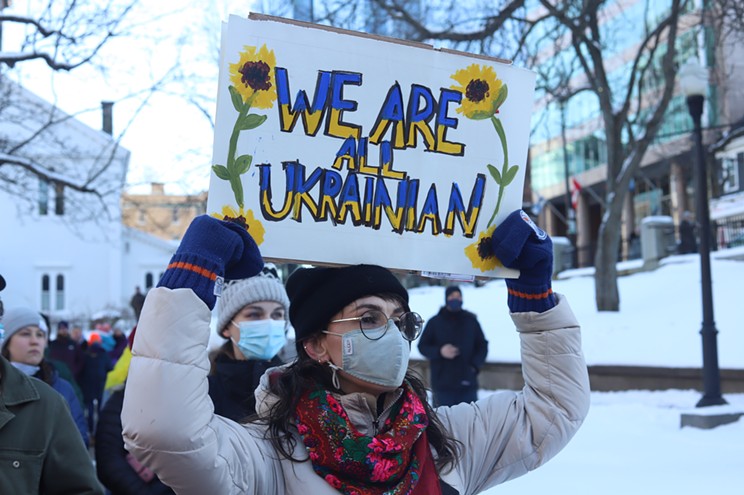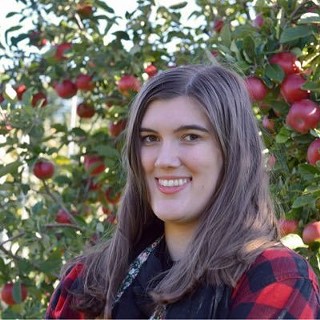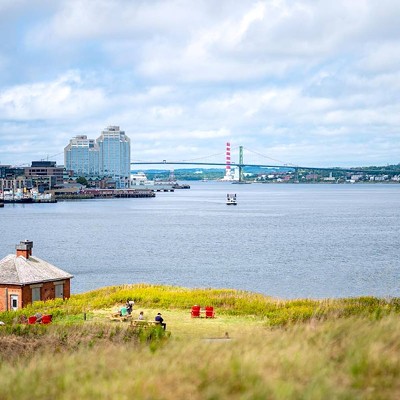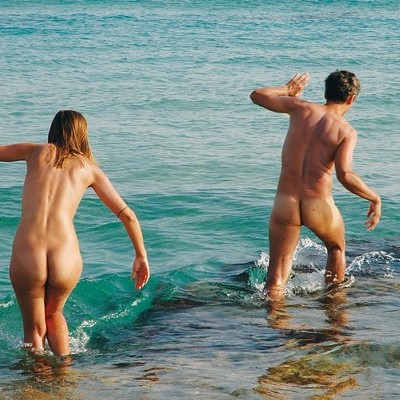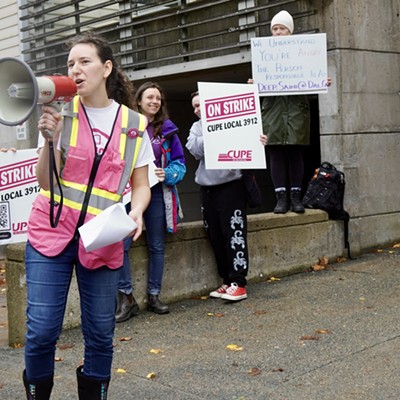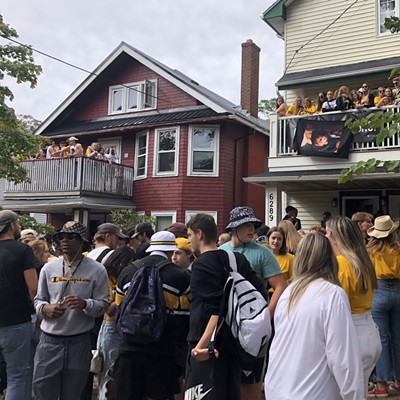Thursday evening, March 10, the 15th day of the Russian invasion into Ukraine, Dalhousie University hosted an online panel discussion on the conflict featuring professors from local universities. Moderator Ruben Zaiotti, the director of the Jean Monnet European Union Centre of Excellence at Dal, opened the panel by explaining how this war could permanently alter the world as we know it, “so we should try to understand it.”
Zaiotti asked each of the six panelists a question to begin, and the remaining 10 were asked by viewers, for a total of 16 questions answered, which we’ve summarized below. You can also watch the full discussion on Dalhousie’s YouTube channel.
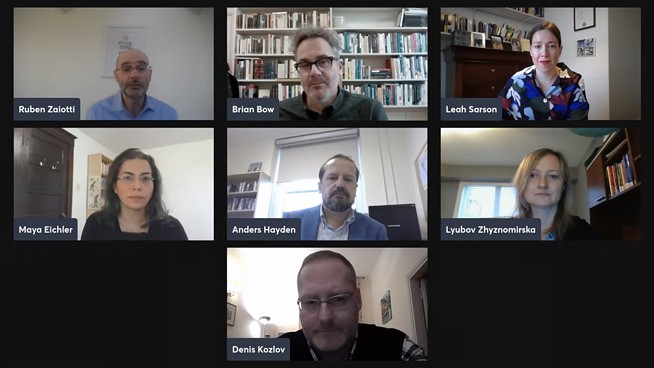
What role does the Canadian government play?
First up to tackle a question was Leah Sarson, an assistant professor of political science at Dalhousie. Sarson explained that Canada has sent a lot to Ukraine, including three shipments of military equipment—deadly tools from machine guns to sniper rifles to ammunition, rocket launchers to hand grenades. But Canada has also sent protective gear like night-vision goggles, gas masks and helmets. We’ve sent $1 million for high-res satellite imaging, and Canadian troops have committed to remain in Poland until 2025 as part of Operation UNIFER.
How can we make sense of the conflict from a historical perspective?
Denis Kozlov, an associate professor of history at Dalhousie, was tasked with explaining how we got here. He called the current events “arguably the most disgraceful war in Russia’s modern history.” Kozlov says that president Vladimir Putin wants to go down in history books as a great ruler of Russia, but he’s far from Catherine the Great or Joseph Stalin. It’s no doubt that Putin will get a place in history books, but Kozlov says “he will be described as a ruler who without any reason, sense or need ruined his own country.”
How do we interpret the conflict through a gendered lens?
“Warrior masculinity has been a key part of Putin’s brand from the very beginning,” says Maya Eichler, associate professor of political studies at MSVU. As Russia has become more militarized and more authoritarian, Eichler also says it’s become more misogynistic and homophobic, and there’s been a steady pushback against women’s rights and the women’s movement. “Including groups like the soldier's mothers,” she says, an organization founded in 1989, “who previously were able to be a really strong voice against war in the late Soviet period and early post-Soviet Russia.” The Russian government dubbed the group a “foreign agent” in 2014.
What does Ukraine's application to the European Union mean?
Associate professor of political science at SMU, Lyubov Zhyznomirska, says that Ukraine’s path to joining the EU began back in 1998, and has been supported by the majority of Ukrainian people since the mid-2000s. The current EU membership request letter submitted by president Volodymyr Zelensky during wartime, Zhyznomirska says, sends the signal to Russia that Ukraine is choosing the European model of democracy, freedom and human rights. Zhyznomirska also says the past 15 days have shown a huge transformation in national and even municipal Ukrainian politics—despite usually being very competitive, “all parties are united” against the war right now.
What role do fossil fuels play?
Fossil fuel extraction is central to Russia’s economy. Anders Hayden, an associate professor of political science at Dalhousie, says the country is the world’s third-largest oil producer and second-largest gas producer, providing an estimated 60 percent of Russian exports. But North Americans probably don’t have to worry, because most of that product ends up in Europe, which Hayden says gets more than a third of its natural gas from Russia. “It’s quite dependent,” he says. But this could provide a good opportunity to divest from fossil fuels, too. “Climate change and the war on Ukraine have the same root,” Hayden says. “Fossil fuels and our dependence on them.
What role does NATO play?
American political scientist John Mearsheimer recently argued that NATO is at fault for the war because of increasing intervention from the West. But Brian Bow, professor of political science at Dalhousie there’s much more to the situation than what international relations theorists could predict. “A lot of theoretical debate is just a mental exercise for the amusement of academics,” he says. Theories don't take into consideration the complexities of the real world, so “nobody should be expecting [academic theories] to do a good job of explaining complicated events like this.”
How did the collapse of the Soviet Union lay the groundwork for this?
The history of tension and conflicts between Russia and Ukraine began with the collapse of the Soviet Union in 1991, says Denis Kozlov. Since the early ‘90s, the Russian public’s view of the world around them has been shaped by the state. “This collapse has been presented to the Russian audience as a trauma,” Kozlov says. Many people were traumatized and impoverished after the collapse, and the Russian government is still trying to avenge what happened 30 years ago. “It will take bitter defeat and economic catastrophe for them to learn the main lesson of this, that undoing this part of history is not possible.”
Is the West more united than ever before?
It depends on what you call “the West” says Leah Sarson. Is it NATO? The EU? Canada has had success with things like its overseas training missions for troops elsewhere, but there have been fault lines in the unity, Sarson says, like the US refusal to let Polish planes land at its German airbase.
Does Putin want to invade other Baltic countries like Moldova or Latvia?
“Only Russian elites know the answer to that, those who are around Putin,” says Lyubov Zhyznomirska, but she thinks the only way to stop Russia from continuing its aggression is a strong response in Ukraine. Anders Hayden says he wouldn’t be surprised if Putin wanted to escalate the situation, since he’s already done some pretty unexpected things, but he and Maya Eichler both agree that after the invasion of Ukraine, Putin most likely won’t have the forces left to fight a new battle on a second front.
What role do media, social media and misinformation play?
People’s view of the war is drawn by the sources they rely on, says Brian Bow. This means depending on your sources, you might be experiencing a completely different reality than someone else. “Misinformation is a real concern here,” he says. Russian propaganda has been widespread since the ‘90s, but Bow says Putin isn’t great at “managing the misinformation,” and most people outside the country “are not convinced by what they’re hearing.” But Leah Sarson says inside Russia, it’s different. “Reports generally suggest that there’s strong support for what’s happening in Russia,” she says.
Does the United Nations have a responsibility to protect Ukrainian civilians?
We really should be talking about the United Nations Responsibility to Protect principle, or R2P, right now, says Leah Sarson. But the language used in R2P wasn’t enough to cause real change in Syria or Libya, so “there’s very little hope and optimism left surrounding the language.” On top of that, Lyubov Zhyznomirska says, Russia has a seat on the UN Security Council, which means it can veto a resolution calling for the UN to act. “Any opportunity to trigger responsibility to protect will be blocked,” she says. The US has said it won’t support the removal of Russia from the Security Council, but Zhyznomirska thinks the security council should be reformed entirely, because “what is at stake is the whole survival of the United Nations and its ability to secure peace in the world.”
How will women and children in Russia deal with the coming financial crisis?
Maya Eichler says domestic violence rates increased in Russia during the pandemic, just like they did everywhere else. Russia also saw a weakening of domestic violence laws with the decriminalization of domestic battery that doesn’t cause “serious bodily harm” in 2017. And while it’s important to put sanctions on Russia, Eichler says that we need to think about the impacts in more nuanced ways, and “make sure that they hurt the right people.”
Is this a war of irredentism?
The word means a reclaiming of territory to a country that believes it was unjustly lost. But Denis Kozlov says that’s not what this war is about. “It’s more than just territorial disputes between the two countries,” he says. “It’s the whole architecture of the post-Soviet space.” Putin isn’t reclaiming, he’s empire-building, Kozlov says, and trying to remake the world according to the way he wants it, “and that’s why it’s so dangerous.”
Are Russia and the West headed toward another Cold War?
Anders Hayden doesn’t see parallels between now and the period after World War Two, because coming out of this Russia will be greatly weakened, and no longer the second-most powerful country in the world. “At best, third,” he says. But Brian Bow says there are other similarities, in the sense that countries are afraid to take action because nuclear weapons could come into play at any moment. Maya Eichler, too, says she’s picked up Cold War rhetoric in how people are talking about “good versus evil” and “freedom versus tyranny” but says the world shouldn’t go back to those binaries.
What will the impacts be on people around the world?
We’ve already seen the jumps at the gas pump, says Denis Kozlov, and we’ll likely see some food cost inflation in Canada as well. But the real food cost concerns are in countries like Turkey, Egypt and Tunisia that rely heavily on grain imports from Russia and Ukraine, and will face limited supply as the conflict continues.
How can people help?
All the panelists were in consensus that donating to Ukrainian charities is a big help. Sarson says the Canadian government is matching donations to the Canadian Red Cross right now, and Hayden says people can even donate to the Ukrainian armed forces if they feel comfortable. Zhyznomirska says it’s important to boycott products from companies that are continuing their relationship with Russia, and Bow says all Canadians should be paying attention to what our government representatives are doing about foreign policy and sanctions—and remember it come next election. While it’s hard to come up with practical advice for people thousands of kilometres from the conflict, panelists say it’s important keep up to date and not to let the spotlight fade; to counter disinformation and research reliable sources; and to remember the Russian people shouldn’t be isolated from truth because of their government’s disinformation campaign.

